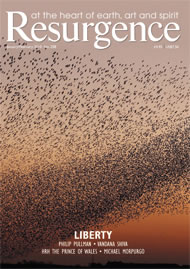Lord Northbourne (1896–1982), born Walter Ernest Christopher James, was the 4th Baron Northbourne of Kent, England. It is not commonly known that the wide range of people he influenced included such prestigious individuals as HRH Prince Charles and Wendell Berry. He collaborated with E. F. Schumacher to bring greater awareness to sustainable farming practices and sustainable ecology as a whole. Nor is it frequently known that he was an adept practitioner of what he termed “organic farming” long before the environmental movement popularised this practice which has since become a norm in holistic or alternative farming circles.
In 1940, with astute clarity of vision, Lord Northbourne diagnosed the emerging disarray of the modern world that was encroaching upon the entire Earth, stemming from a fundamental dissociation from Nature. He consequently also underscored its cure – to embrace the interdependence of Nature, the terrestrial community and the sacred as an undivided whole. A vital facet of his life came to fruition when he was introduced to the perennialist or traditionalist school via Buddhist author and fellow perennialist Marco Pallis, who contacted him after reading his first book Look to the Land, published in 1940. From this point on Lord Northbourne aligned himself with this perspective. Not only did he contribute to the perennialist writings with influential works that functioned as matchless introductions to this school of thought, such as Religion in the Modern World and Looking Back on Progress, but he also translated several axial texts from this school into English.
Of the Land and the Spirit is divided into five providential themes, containing many of Lord Northbourne’s writings that have never before been published in book form: ‘Farming: An Ecology in Practice’, ‘On the Value of Tradition’, ‘Metaphysical Principles’, ‘Art and Symbolism’, and ‘Lessons from Life’. Included in the Appendix is the private correspondence between Lord Northbourne and the renowned Trappist monk Thomas Merton.
The insightful Foreword by the esteemed author Wendell Berry sets the tone for this anthology by affirming the integral relationship of spirituality and ecology that is all too often unacknowledged, especially with the prevailing Cartesian-Newtonian paradigm of contemporary scientism – coupled with the radical secularism of our age: “Those who take agriculture seriously enough and study it long enough will come to issues that will have to be recognised as religious.”
These essays will thwart the apparatus of time within the reader in order to ground the perennial point of view that has always and everywhere been acknowledged. There are many beloved essays that will connect with the diversity of readers, such as ‘Agriculture and Human Destiny’, ‘The Beauty of Flowers’, ‘Religion and Tradition’ and ‘Looking Back on Progress’. Each of these essays, although unique and different from the others, contains an underlying reality vividly expressed in the Lakota affirmation Mitakuye Oyasin: ‘We Are All Related’.
And yet the idea of the interconnectedness of all of life, although irrefutably true, is not an end in itself as is often assumed by proponents of the new paradigm or by holistic circles. The web of life necessarily implies not only wholeness, but a transcendent unity that manifests creation and is none other than a theophany, guiding this creation and reintegrating the human individual within the terrestrial journey, as exemplified by the hermetic maxim “As above, so below”.
One hears a lot of talk about the need for us to “build a better world” and we are pestered with conflicting policies, reforms, reorganisations and long-term plans meant to create this terrestrial Utopia. But if the word ‘better’ does not mean ‘nearer to God’, all those manoeuvrings will lead to nothing but growing confusion and, in the end, to utter darkness.
We are extraordinarily fortunate to have this recent publication available and I cannot recommend it highly enough. This anthology belongs in the library of every ‘seeker’, as it presents an integral orientation that embraces the fullness of the human potential and what it accurately means to be human, which is inseparable from what is transpersonal or divine.







